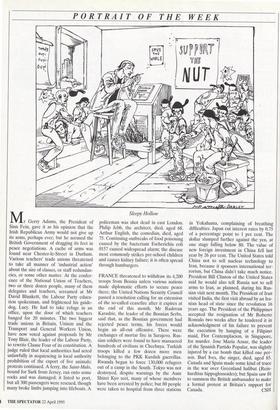PORTRAIT OF THE WEEK
Sleepy Hollow Mr Gerry Adams, the President of Sinn Fein, gave it as his opinion that the Irish Republican Army would not give up its arms, perhaps ever; but he accused the British Government of dragging its feet in peace negotiations. A cache of arms was found near Chester-le-Street in Durham. Various teachers' trade unions threatened to take all manner of 'industrial action' about the size of classes, or staff redundan- cies, or some other matter. At the confer- ence of the National Union of Teachers, two or three dozen people, many of them delegates and teachers, screamed at Mr David Blunkett, the Labour Party educa- tion spokesman, and frightened his guide- dog, Lucy. He had to take refuge in an office, upon the door of which teachers banged for 20 minutes. The two biggest trade unions in Britain, Unison and the Transport and General Workers Union, have now voted against proposals by Mr Tony Blair, the leader of the Labour Party, to rewrite Clause Four of its constitution. A judge ruled that local authorities had acted unlawfully in acquiescing in local authority prohibition of the export of live animals; protests continued. A ferry, the Saint-Malo, bound for Sark from Jersey, ran onto some rocks and was damaged; it listed to port, but all 300 passengers were rescued, though many broke limbs jumping into lifeboats. A policeman was shot dead in east London. Philip Jebb, the architect, died, aged 68. Arthur English, the comedian, died, aged 75. Continuing outbreaks of food poisoning caused by the bacterium Escherichia coli 0157 caused widespread alarm; the disease most commonly strikes pre-school children and causes kidney failure; it is often spread through hamburgers.
FRANCE threatened to withdraw its 4,200 troops from Bosnia unless various nations made diplomatic efforts to secure peace there; the United Nations Security Council passed a resolution calling for an extension of the so-called ceasefire after it expires at the end of this month. Mr Radovan Karadzic, the leader of the Bosnian Serbs, said that, as the Bosnian government had rejected peace terms, his forces would begin an all-out offensive. There were exchanges of mortar fire in Sarajevo. Rus- sian soldiers were found to have massacred hundreds of civilians in Chechnya. Turkish troops killed a few dozen more men belonging to the PKK Kurdish guerrillas. Rwanda began to force 130,000 refugees out of a camp in the South. Tokyo was not destroyed, despite warnings by the Aum Shinri Kyo sect, many of whose members have been arrested by police; but 80 people were taken to hospital from three stations in Yokahama, complaining of breathing difficulties. Japan cut interest rates by 0.75 of a percentage point to 1 per cent. The dollar slumped further against the yen, at one stage falling below 80. The value of new foreign investment in China fell last year by 26 per cent. The United States told China not to sell nuclear technology to Iran, because it sponsors international ter- rorism, but China didn't take much notice. President Bill Clinton of the United States said he would also tell Russia not to sell arms to Iran, as planned, during his Rus- sian visit next month. The President of Iran visited India, the first visit abroad by an Ira- nian head of state since the revolution 16 years ago. The President of the Philippines accepted the resignation of Mr Roberto Romulo two weeks after he tendered it in acknowledgment of his failure to prevent the execution by hanging of a Filipino maid, Flor Contemplation, in Singapore, for murder. Jose Maria Azuar, the leader of the Spanish Partido Popular, was slightly injured by a car bomb that killed one per- son. Burl Ives, the singer, died, aged 85. Canada and Spain made some kind of truce in the war over Greenland halibut (Rein- hardtius hippoglossoides); but Spain saw fit to summon the British ambassador to make a formal protest at Britain's support for


























































 Previous page
Previous page